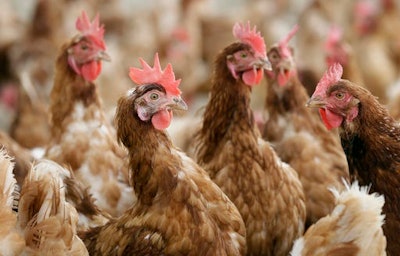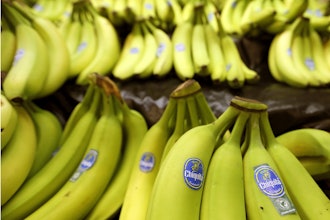
WASHINGTON (AP) — The Agriculture Department on Thursday proposed stricter animal welfare standards for organic chicken and meat in a multibillion-dollar market that is rapidly expanding each year.
The rules would ensure that all livestock, including poultry, have enough space to lie down, turn around, stand up and fully stretch their limbs. Beaks couldn't be removed and tails couldn't be cut. Poultry houses would have to have fresh air and ventilation.
"This will support the continued growth in the organic livestock and poultry sectors, and ensure consumer confidence in the organic label," said Miles McEvoy, the head of USDA's organic program.
The retail market for organic products is valued at almost $40 billion in the United States. USDA said this week that the number of certified organic operations in the United States increased by almost 12 percent between 2014 and 2015, the highest growth rate since 2008 and an increase of nearly 300 percent since the department began counting operations in 2002.
The broadest changes proposed by USDA would cover outdoor access for poultry, suggesting standards for how densely poultry can be stocked as well as minimum indoor and outdoor space requirements. The rules would require poultry have access to areas that are at least 50 percent covered in soil. Hen houses would not be allowed to only have a porch; producers would have to provide additional outdoor space.
In addition to clean water and direct access to sun and shade, the rules would require producers to design facilities to encourage all birds to go outside on a daily basis. The outdoor areas would have to have "suitable enrichment" to entice birds to go outside, McEvoy said.
The amount of outside access for poultry has been a subject of debate, as some food safety advocates have expressed concerns that more outdoor access may increase the chances of salmonella contamination. The Food and Drug Administration issued guidance in 2013 to try to help organic egg producers better prevent salmonella, a bacteria that can cause diarrhea, fever, and abdominal cramps and can be deadly without prompt antibiotic treatment.
The Organic Trade Association, which represents many of the nation's largest companies that sell organic products, did not comment on specifics of the proposal. But the group's president, Laura Batcha, said she was pleased USDA is moving forward with the rule.
"Ensuring that the high expectations consumers have for organic foods are met preserves the organic seal's reputation as the gold standard for agricultural production practices," Batcha said.
Other producers expressed concerns.
Jim Byrum, president of the Michigan Agri-Business Association, said the rules could slow business for egg producers, which could in turn reduce the demand for organic corn and soybeans that the chickens eat.
"Eliminating porches that already allow organic hens to be outside would render tens of millions of dollars of investment by many organic egg producers obsolete," Bynum said. "The proposal also makes deeply unrealistic assumptions about food safety, requiring direct exposure of hens to the outdoors."
McEvoy said USDA understands the rules would mean additional investment for some businesses. But he said the rules would "assure consumers that organically produced products meet a consistent standard."





















